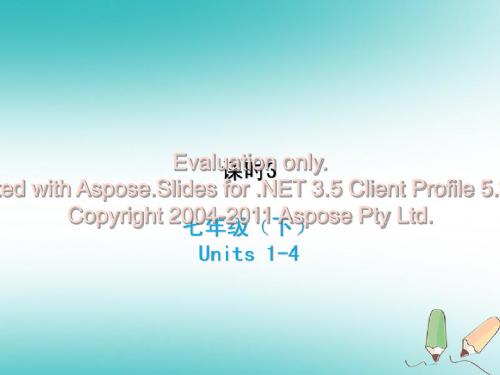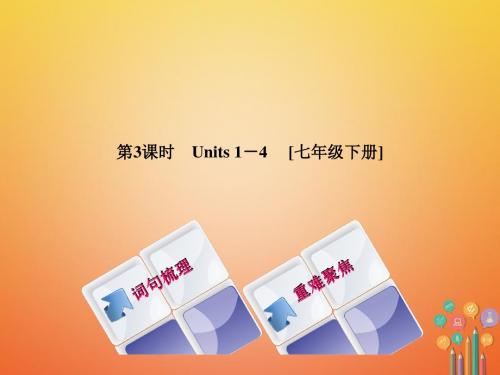2018年中考英语总复习 教材梳理 七下 第3节 Units 1-4精讲课件含答案
2018届中考英语复习 课时3 七下 Units 1-4课件 人教新目标版

19.clean v.打扫;弄干净adj.干净的→ cleaner n.清洁工 20.quick adj.快速的→ quickly adv.很快地
truth n.实情;事实 31.fight v.& n.打架;战斗→ fought (过去式/过去分词)
21.life n.生活;生命→ lives (复数)
Evaluation only. ted with Aspose.Slides for .NET 3.5 Client Profile 5.2
Copyright 2004-2011 Aspose Pty Ltd.
课前自主热身
1.sing v.唱歌→ sang (过去式)
8.show n.演出;节目 v.给……看;展示→showed(过去式)
4.祈使句
ted with Aspose.Slides for .NET 3.5 Client Profile 5.2 语 2.时间介词at,on,in 法 3.What, What time, When, How以及How词组引导的特殊疑
5.情态动词(have to 和must)
问句Copyright 2004-20161.一般A疑问s句p及o其简s略e回答Pty Ltd.
20. come true 实现;成为现实
4. talk...to... 跟……说
短 语
5.
play the piano 弹钢琴
集 锦
6.
be good with
善于应付……
13. do (one's) homework 做作业 14. take a walk 散步;走一走 15. either...or... 要么……要 么……;或者……或者……
人教新目标版中考英语总复习教材过关七下第3课时Units1_4教学课件

词句梳理
重难聚焦
第3课时
Units 1-4
minute
词句梳理
重难聚焦
第3课时
类别
Units 1-4
[七年级下册]
课标考点要求
like 13.________ prep.像;怎么样 leave v.离开;留下 14.________ important 15.________ adj.重要的 bring v.带来;取来 16.________ quiet adj.安静的 17.________ strict adj.严格的;严厉的 18.________ remember 词汇 19.________ v.记住;记起 keep v.保持;保留 识记 20.________ play chess 下国际象棋 21.____________ be good at…擅长于…… 22.____________ speak English 23. ____________ 说英语 follow the rules 24.______________ 遵守规则 be strict (with sb) 25._______________ (对某人)要求严格 play the piano 26._____________ 弹钢
词句梳理
重难聚焦
第3课时
Units 1-4
[七年级下册]
针对训练 1.你能把你的贵宾卡给我看一下吗? Can you show me your VIP card? ___________________________________________________ 2.The geography teacher is showing us the map of China.( 改为同义句) The geography teacher is showing the map of China to us. ___________________________________________________ 3.The famous artist's works are ________ . A A.on show B.showing out C.showing off
2018年中考英语总复习 :第一轮 课本知识聚焦 第3讲 七年级(下)Units 1-4教学课件

talked 过去式/过去分词)说话;交谈 16. talk(v.)→ _______(
made 17. make(v.)→ __________( 过去式/过去分词)使成为;制造
rode 过去式)→ _________( ridden 过去分词)骑 18. ride(v.)→ ________( drove 过去式)→ ______( driven 过去分词)开车→ ________( driver 19. drive(v.)→ ________( n.)驾 驶员;司机 listened 20. listen(v.)→ ___________( 过去式/过去分词)听;倾听 earlier 比较级)较早的→ __________( earliest 21. early(adj.)→ __________( 最高级)最早的→ late ________( adj.反义词)晚的 runner n.)跑步者 ran 过去式)跑;奔→ _______( 22. run(v.)→ running _______(现在分词)→ ___(
old adj.反义词)旧的 23. new(adj.)→ _______( left 过去式/过去分词)离开 24. leave(v.)→ _______( unusual adj.反义词)不寻常的;与众不同的→ usually 25. usual(adj.)→ _______( ______(adv.) 通常地;一般地 cleaner n.)清洁工 26. clean(v.)→ _________( truly truth n.)实情;事实 27. true(adj.)→ ________( adv.)真正;确实→ ________(
noise n.)噪音 quiet adj.反义词)安静的→ ________( 28. noisy(adj.)→ ________(
2018届中考英语复习课时3七下Units1_4课件冀教版

令人愉快的
moving (n.)(身体部位的)运动;移动 9.move(v.)→____________ 10.tour(n.& v.)→____________ (n.)旅游者;观光者;游客 tourist across 11.cross(v.)→____________ (prep.)横过;从一边到另一边 →____________ crossing (n.)十字路口 widely 12.wide(adj.)→____________ (adv.)广泛地
课时3
七年级(下) Units 1-4
课前自主热身
led 1.lead(v.)→____________ (过去式/过去分词)带领;指路 leader →____________ (n.)领导者;领袖;首领 sent 2.send(v.)→____________ (过去式/过去分词)寄;送 cultural (adj.)与文化有关的;文化的 3.culture(n.)→____________ 4.arrive(v.)→____________ arrival (n.)到达 left 5.leave(v.)→____________ (过去式/过去分词)动身;出发; 离开 hit 6.hit(v.)→____________ (过去式/过去分词) 词 汇 拓 展 hitting (现在分词)击,击中 →____________ rang (过去式) 7.ring(v.)→____________ rung →____________ (过去分词)敲(钟);打电话; 按(铃);鸣;响 enjoyable (adj.)有乐趣的;使人快乐的; 8.enjoy(v.)→____________ mainly 13.main(adj.)→____________ (adv.)主要地;首要地 believable (adj.)可信的 14.believe(v.)→____________ safely 15.safe(adj.)→____________ (adv.)安全地;平安地 safety →____________ (n.)安全;平安 fell 16.fall(v.)→____________ (过去式) fallen →____________ (过去分词) falling →____________ (现在分词)落下;跌倒 held 17.hold(v.)→____________ (过去式/过去分词)举行;拿着 interesting (adj.)有趣的;令人感兴趣的 18.interest(n.)→____________ interested (adj.)感兴趣的 →____________ European (n.& adj.)欧洲人;欧洲(人) 19.Europe(n.)→____________ 的 Asian (adj.)亚洲的 (n.)→____________
2018届中考英语复习课时3七下Units1-4备考精编含解析人教新目标版

2018届中考英语复习课时3七下Units1-4备考精编含解析人教新目标版课时3 七年级(下)Units 1-4Ⅰ.语法与情景对话1.[2017上海]—Do you know a 5-day tripto Hong Kong costs?—I guess it’s about ¥4,000.A. how fastB. how longC.how soon D. how much2.[2017西宁]—Excuse me, can you tell me wherethe nearest bank is, please?— Oh yes! It’s past the office, nextto a big market.A. You’re welcome.B. Oh, I begyour pardon?C. Umm..., let me think.D. What do you mean?3.[2017西宁]Shanghai Disneyland opened June 16, 2016.We want to visit it.A. followB. changeC.make D. break8. —Hi, guys. Where were we yesterday?—We learned the differences fact and opinion.A. betweenB. amongC.during D. beyond9.[2017南京]—Millie, do you take thecourse in DIY?—Every Saturday afternoon.A. how longB. how farC.how much D. how often10. The running water makes the stones very smooth.A. soundB. tasteC. smellD. feel11. I live in a(n) neighborhood. Manypeople and cars come and go very often.A. quietB. emptyC. noisyD. lonely12. —When shall we go to the theater again,next Saturday or next Sunday?— day is possible. I’m free.A. AnyB. NeitherC.Either D. Every13. I like playing the violin, and I want to become a in the future.A. astronautB. driverC.musician D. doctor14. —What do you our new English teacher Miss Li?—Well, she was a little nervous in her firstclass this morning, but I believe she will bebetter later.A. think overB. think upC.think of D. think about15. It’s seven o’clock now. I am of missing the early bus.A. tiredB. afraidC. fullD. carefulⅡ.完形填空[2017安徽改编]Bike-sharing is a new choice for short journeys in cities. It is good to the 1 development of the big cities.A 2 by a company found that shared bikes started the nation’s 3 for bikes again. Now more and more Chinese people are 4 bikes instead of cars to make short journeys in cities.An engineer of that company says that since the 5 of shared bikes, people have made fewer trips by car. The love for shared bikesis not only among 6 people, who were bornin the 1980s and 1990s, but also among people over sixty.At weekends, the number of the riders in Shenzhen reaches the 7 of all cities. On weekdays, the number of people who use shared bikes to travel to work is 8 in Shanghai.It is said 9 bike sharing will help improve the cities environment. It not only helps solve the traffic problems, but also will help to make more use of 10 in cities. Take Beijing as an example, if more people choose shared bikes, an area of five Bird’s Nest stadiums (体育场) will be saved.1. A. slow B.healthyC.harmfulD.sudden2. A. rule B. plan C.reportD.suggestion3. A. search B. worry C.preparationD. love4. A. choosing B.pushingC.repairingD.locking5. A. end B. start C.controlD. fall6. A. strong B. weak C. old D.young7. A. top B. side C.cornerD. line8. A. coming over B.puttingoffC.goingupD.givingaway9. A. who B. which C. D. thatwhether10. A. air B. time C.spaceD.moneyⅢ.阅读理解[2017河南]The idea that red means stop and green means go has influenced our lives in more ways than just traffic signals(信号). We have been taught from a young age that the color red means danger and green means it’s okay to move forward. But why were those colors chosen for traffic lights in the first place? For something we have to look at every day, why couldn’t they have been prettier colors?Well, it’s important to know that before traffic lights for cars, there were traffic signals for trains. At first, railway companies used red to mean stop, white to mean go, and green to mean warn. As you could imagine, trainsran into a few problems with white meaning go. For example, one train mistook a bright star for a white light and something unexpected happened. Because of that, railway companies finally moved green meaning go and used yellow to mean warn. And it’s been that way ever since.Red has always been a color that meant danger, long before cars were even around. This most likely started because it’s the color with the longest wavelength(波长) so it can be seen somewhere farther than other colors.But, believe it or not, yellow was once used to mean stop. Back in the 1900s, some stop signs were yellow because it was too hard to see a red sign in a poorly lit area. Finally, highly reflective materials(高反射材料) were developed and red stop signs were born. Since yellow can be seen well at all times of the day,school zones, some traffic signs, and schoolbuses continue to be painted yellow.So next time you are impatiently waiting ata traffic light, don’t get so mad at them;they’ve certainly come a long way.1.What were traffic signals for before trafficlights for cars?A. Trains.B. Boats.C. Planes.D. Bicycles.2. meant go at first.A. RedB. YellowC.White D. Green3. Why does red mean danger?A. Because it’s the brightest color.B. Because it can be seen far away.C. Because railway companies say so.D. Because it has the shortest wavelength.4. Why are school buses painted yellow?A. Because yellow is a prettier color.B. Because yellow once meant danger.C. Because yellow can be seen well in daytime.D. Because yellow means it’s OK to go forward.5. What does the text mainly tell us?A. How important traffic lights are.B. Which color has the longest wavelength.C. What red, yellow and green can be used for.D. Why traffic lights are red, yellow and green.Ⅳ.任务型完形填空Brian was a funny student. He loved watching comedies (喜剧) 1. and hoped to become a comedy actor one day.When he heard about the talent show to be held at this school, Brian 2. to take part in.He had never acted on stage (舞台) before, and he was very excited. But some students laughed at him. “You are not funny but silly,”Ken, one of his 3. , said to his face. “No one will like what you do,” another boy also said to him 4. .Brian 5. understand why they were so unkind to him. He thought about giving up but he remembered his teachers said he was very funny. So he didn’t.Brian did a great job at the talent show. Everyone loved his performance, and he won the 6. prize! His teachers and friends were proud of him. Even so, Ken told Brian that hewas not funny, and that he would never be7. .As the years went on, Brian met more peoplelike Ken. “You’ll do a terrible job,” theysaid to him. Luckily, most people encouragedhim and some helped him to become even funnier.He got a lot of8. to perform in movies. He was even 9. to appear on television.Now Brian is a big comedy star! He is doingwhat he 10. best.V.根据所给汉语提示完成下列句子(每空限填一词)1.[2017荆州改编]父母不应该对青少年太严格。
中考英语总复习第3课时七下Unit1_4课件

(4)不要在过道里奔跑。
Don’t run in the hallways.
单词必会 词汇拓展 短语必背 句型掌握 重点语法 口语交际 重点词汇过关检测
谈论技能 1.—Can you swim? —Yes,I can./No,I can’t. 2.—What can you do? —I can dance. 谈论日常安排 1.—What time do you usually get up? —I usually get up at six thirty. 2.—When does Scott go to work? —He always goes to work at eleven.
第3课时 Unit1~Unit4
单词必会 词汇拓展 短语必背 句型掌握 重点语法 口语交际 重点词汇过关检测
1.guitar n.吉他
2.sing v.唱歌
3.swim v. 游泳
4.dance v. 跳舞 n. 舞蹈
5.draw v. 画
6.speak v.
说(某种)语言;说话
7.join v. 参加;加入
13.think of 认为;想起
14.
between...and...
在……和……之间
e true 实现;成为现实
16.on time 准时
17.go out 外出(娱乐)
18.do the dishes 清洗餐具
19.make one’s bed 整理床铺
20.be strict with sb.(对某人)要求严格
3.晚上我要么看电视要么玩电脑游戏。
In the evening,I either watch TV or play computer games.
中考英语考点复习PPT课件七下Unit 3~Unit4

七下 Module 2中考必考 词汇、句型讲解
blind programme mean apologize useful harmful disease dig fight hole
allow appear wake airport lead imagine against scuss produce major
arrive at by oneself lead (sb.)to fall asleep get down for example provide sb. with wth. take in look around millions of cut down
wake up fire engine at last look after go back to in fact be home to be made of be made from
2. The receptionist apologized and led John and Charlie to their room. (1) apologize to sb. for sth. 因为……向某人道歉 I should apologize to you for my mistake. 我应该 为我的错误向你道歉。 (2) apology n. make an apology to sb. 向某人道歉 I made an apology to her.我向她道歉了。 (3) lead sb. to sp. 带某人去某地 = take sb. to sp. She led us to her home.她把我们带到她家里。
1. You’re welcome to stay, but I’m sorry that we don’t allow pets here. (1) allow sb. to do sth. 允许某人做某事 My boss doesn’t allow me to use the telephone.我 上司不允许我使用电话。 (2) allow doing sth. 允许做某事 They allow smoking in this room only.他们只允许 在这间房间吸烟。
中考英语复习第3讲七下Units1_4讲本课件

重点单词
词汇拓展
话题佳句积累
一词多义
重点词组 语法
3.John Denver was one of the most famous country
singers
in America 50 years ago.
headmaster and went popular.
“It was -9℃ in the morning and also the first day for
the end-of-term exam,” said Fu.“The boy's parents work
in other 13. cities (城市) and he lives with his brothers and sister.”The school 14. provides(提供) breakfast and
01
纳归识知 理梳点考
•
重点单词
词汇拓展
话题佳句积累
一词多义
重点词组 语法
重点单词
词汇拓展
话题佳句积累
一词多义
重点词组 语法
重点单词
词汇拓展
话题佳句积累
一词多义
重点词组 语法
重点单词
词汇拓展
话题佳句积累
一词多义
重点词组 语法
重点单词
词汇拓展
话题佳句积累
一词多义
重点词组 语法
重点单词
词汇拓展
hour to 8. attend (上课) classes,according to the school
- 1、下载文档前请自行甄别文档内容的完整性,平台不提供额外的编辑、内容补充、找答案等附加服务。
- 2、"仅部分预览"的文档,不可在线预览部分如存在完整性等问题,可反馈申请退款(可完整预览的文档不适用该条件!)。
- 3、如文档侵犯您的权益,请联系客服反馈,我们会尽快为您处理(人工客服工作时间:9:00-18:30)。
7. ____________ v.& n.说话;交谈★ talk
also 8. ____________ adv.也;而且 people 9. ____________ n.人们★ today 10. ____________ adv.今天 musician n.音乐家★ 11. ____________ shower 12. ____________ v.& n.淋浴; n.淋浴器(间)
violinist 1. violin(n.)→____________( n.)小提琴家 central 2. center(n.)→____________( adj.)中心的;中央的★ teeth 3. tooth(n.)→____________( pl.)牙齿★
4. work(n.& v.)
every 30. ____________ adj.每一;每个★
live 31. ____________ v.居住;生活
32. ____________ v.横过;越过 cross
river 33. ____________ n.河;江 between prep.介于……之间★ 34. ____________ bridge 35. ____________ n.桥 boat 36. ____________ n.船 afraid 37. ____________ adj.害怕;畏惧★ like 38. ____________ prep.像;怎么样★
worker →____________( n.)工作者;工人 works →____________( pl.)作品★ lives 5. life(n.)→____________( pl.)生活;生命★ villager 6. village(n.)→____________( n.)村民★ noisy 7. noise(n.)→____________( adj.)吵闹的★
英 语
2018 河 南
第三节 七年级(下) Units 1~4
CONTE NTS
过教材
目 录
过考点
过能力
过教材
guitar 1. ____________ n.吉他 join 2. ____________ v.参加,加入★ club 3. ____________ n.俱乐部;社团 tell 4. ____________ v.讲述;告诉 story 5. ____________ n.故事;小说★ or 6. ____________ conj.或者;也不(用于否定句)
rule 39. ____________ n.规则;规章★ hall 40. ____________ n.大厅;礼堂 listen 41. ____________ v.听;倾听★ fight 42. ____________ v.& n.打架;战斗 sorry 43. ____________ adj.抱歉的;难过的;惋惜的★
forty 13. ____________ num.四十
never 14. ____________ adv.从不;绝不★
early 15. ____________ adj.& adv. 早(的)★ job 16. ____________ n.工作;职业 station 17. ____________ n.电(视)台;车站 night 18. ____________ n.晚上;夜晚★ funny 19. ____________ adj.奇怪的;滑稽可笑的 exercise n.& v.锻炼;练习★ 20. ____________ half 21. ____________ n.& pron.一半;半数★ quarter n.一刻钟;四分之一★ 22. ____________
44. ____________ adv.在外面; adj. 外面的★ outside
important adj.重要的★ 45. ____________
quiet 46. ____________ adj.安静的★ out 47. ____________ adv.外出 practice n.& v.练习★ 48. ____________ dish 49. ____________ n.碟;盘 dirty 50. ____________ adj.脏的
either 7. ____________ conj. 或者; adv.也 ★ taste 8. ____________ v.有……的味道,品尝; n.味道,滋味 train 9. ____________ n.火车; v.训练,培训★ stop 10. ____________ n.车站,停止; v.停止,阻止★
51. ____________ kitchen n.厨房★
feel 52. ____________ v.感受;觉得★
53. ____________ adj.严格的;严厉的★ strict
remember v.记住;记起★ 54. ____________ follow 55. ____________ v.遵循;跟随★ hair 56. ____________ n.头发;毛发
熟词新义
dance 1. ____________ n.舞蹈; v.跳舞
2. ____________ n.家,活动本部; adv.到家,在家★ home
dress 3. ____________ n.连衣裙; v.穿衣服★ brush 4. ____________ n.刷子; v.刷,刷净 past 5. ____________ prep. 晚于,过; adj.过去的 clean 6. ____________ v.打扫,弄干净; adj.干净的
sometimes adv.有时★ 23. ____________
ride 24. ____________ v.骑;n.旅程 bike 25. ____________ n.自行车 ninety num.九十 26. ____________ hundred num.一百 27. ____________ minute 28. ____________ n.分钟★ kilometer(kilometre) n.千米;公里 29. ____________________
